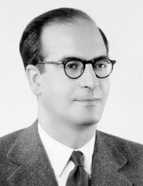

As to his civic intervention, the most recent remarks were made by José Brissos (in introducing the exhibition by Ana Macedo, Jorge Borges de Macedo: Private and Published, 2010), who emphasized that JBM “lived out in an intense, almost dramatic way, the spiritual, political and cultural experience of the twentieth century”, participating in the debates and the intellectual and political choices taking place, amply portrayed in his work, in an ideological evolution that generated controversy amongst those who did not understand it. He was driven by imperatives of conscience and rational choice, by truth, by freedom and moral dignity and by independence in the face of authority. His political choices, then, were the consequence of a maturing of his private opinions, and of his inconformity. While in his youth he had been a political activist in opposition to the Estado Novo, and a student leader close to the structures of the PCP, and involved in groups such as MUNAF and MUD, in 1948 he supported the presidential candidacy of Norton de Matos, and was later involved in the Mealhada revolt and was imprisoned in the Aljube fortress. Later he distanced himself from these organizations and in the face of the Spanish Civil War, the German-Soviet Pact of 1939, the PCP’s unswerving loyalty to Moscow, and the invasion of Hungary in 1956, JBM ceased to be an opponent of the regime, although he always maintained a critical independence towards the Estado Novo, advocating changes that would guarantee greater liberties, political participation, and effective internal debate. However, favouring reforms and renewal rather than revolutions, he considered that democracies needed some principle of authority. At the same time he gave his attention to social problems and to the social doctrines of the Catholic Church. For these reasons he welcomed with some optimism the government of Marcelo Caetano and the revolution of 25 April 1974.
JBM belonged to the Portuguese Academy of History, the International Academy of Portuguese Culture, the Portuguese Commission of the Comité International des Sciences Historiques (Lisbon), the Comité International de l’histoire des mouvements sociaux et des structures sociales (Paris), the Historical Association (London), he was academic correspondent to the Brazilian Historical and Geographical Institute (Rio de Janeiro), corresponding member of the Brazilian Society for Historical Research and the Academia Paulista de História (São Paulo). He was also a corresponding member of the Maritime History section of the Naval Academy (1984), of the Real Academia de la Historia de España, academic correspondent to the National Academy of History of Venezuela, corresponding member of the Fourth Section (History and Geography) of the Lisbon Academy of Sciences (from 1989), and a member of the European Science Foundation. In February 1990 he was nominated vice-president of the Higher Council for the Defence and Safeguarding of Heritage. At UNESCO he was also a member of the Latin American History Commission.
